Transmission of Friday 21 November 2003 at 20.00 and 21.30 CET on Europe by Satellite ; Re-transmission on Saturday 22 November 2003 at 9.30 CET on Europe by SatelliteBalkan countries step up the fight against organised crime | 12 March 2003: Serbian Prime Minister Zoran Djindjic is shot dead in front of a government building in Belgrade. Exactly six months later, Swedish Foreign Affairs Minister Anna Lindh was stabbed to death while shopping in Stockholm.
1. Intro sequence : OC infiltrates highest political circles – Djindjic murder 12 March 2003: Serbian Prime Minister Zoran Djindjic is shot dead in front of a government building in Belgrade. Exactly six months later, Swedish Foreign Affairs Minister Anna Lindh was stabbed to death while shopping in Stockholm. Strange crossed destinies: Anna Lindh was in Belgrade to see Djinjdjic on the very day of his murder. For a meeting that never took place. The parallel ends here. The murder in Sweden proved to be the individual act of a mentally disturbed person. But in Serbia, it was the most blatant proof of the power of organized crime – infiltrated in the highest political circles. | Shots of Djindjic’s car rushing away after the shots were fired.
Street atmosphere in Sweden after Anna Lindh’s death. Street atmosphere in Belgrade after Djindjic murder. | Natasa Micic, Speaker of the Serbian Parliament “...A state of emergency is proclaimed on the territory of the Republic of Serbia.” The next day, Serbian authorities launched huge police raids to crack down on criminal networks suspected of the Prime Ministers’s murder. Massive arrests were made, hundreds were jailed. For many, this hunt for criminals came too late. Dirty cases were suddenly disclosed, demonstrating how closely the criminal groups were tied to certain police and State Security services. | Serbian Parliament session proclaiming state of emergency 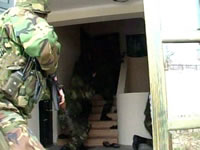
| 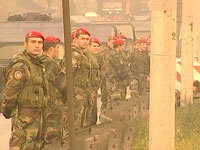 2. The ingredients of OC in the Balkans – political links – post-conflict zones – weak borders – trafficking of goods and human beings 2. The ingredients of OC in the Balkans – political links – post-conflict zones – weak borders – trafficking of goods and human beings
This man, Zvezdan Jovanovic, is accused of having pulled the trigger of the sniper rifle that killed Djindjic. On the day of the murder, he was deputy commander of the Unit for Special Operations, the notorious Red Berets. Hiding behind patriotic rhetoric, members of that unit often served as the executive hand of criminal gangs. Eventually, many of these so-called patriots ended up on the wanted list, but the power of such groups remain a serious threat to stability in the Balkans. | 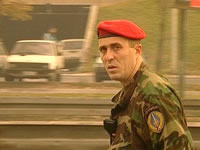
“Wanted” list of criminals of the “Zemun Gang” | 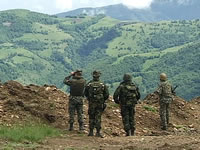 These mountains are well known on the map of organized crime. A triangle border area between Macedonia, Kosovo and Albania. The Kodra Fura border crossing became a strategic point in the recent conflict in Macedonia. From here, almost every route between Kosovo and Macedonia can be controlled. But hiding behind the ethnic conflict, well organized mafias operate across border lines. In this hard to control, inhospitable land, weapons and drugs smuggling flourishes, ignoring ethnic differences. To these criminal networks, the new and poorly managed border lines of the region form a shield rather than a barrier. Once crossed, the police is left one step behind. These mountains are well known on the map of organized crime. A triangle border area between Macedonia, Kosovo and Albania. The Kodra Fura border crossing became a strategic point in the recent conflict in Macedonia. From here, almost every route between Kosovo and Macedonia can be controlled. But hiding behind the ethnic conflict, well organized mafias operate across border lines. In this hard to control, inhospitable land, weapons and drugs smuggling flourishes, ignoring ethnic differences. To these criminal networks, the new and poorly managed border lines of the region form a shield rather than a barrier. Once crossed, the police is left one step behind.
More and more action is being taken by Balkan countries to stop criminals. In this recent case, fleeing over the border was of no help. Dilaver Boiku, nicknamed Leka, the Balkan king of prostitution, escaped from a Macedonian prison last July. Two weeks
later he was arrested in Ulcinj by the Montengrin police, and immediately extradited to Macedonia. | 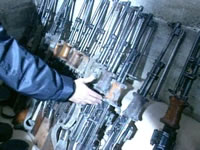
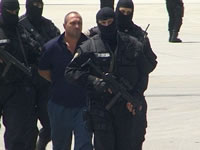
| 3. The damage caused by OC in the Balkans: human damage – losses of revenues - slow reforms – image problem This was Leka’s stronghold: the village of Velesta in Western Macedonia, which became the main crossroads of sex industry in the Balkans. Increased cooperation between the Macedonian and the Montenegrin police helped crack Leka’s network. A big step. But according to a recent report released by the Stability Pact for South East Europe, traffickers are quickly changing their methods to keep their lucrative sex business going. Trapped girls cannot be found openly in night bars anymore. They have been moved deeper underground to secret private locations, far from the public’s eye. The Stability Pact report on human trafficking also reveals that Balkan countries, which up to now were transit routes, are increasingly becoming final destination countries for victims. | 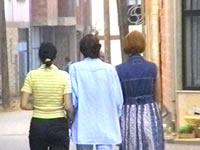
| Thirty-one year old Marina is one of them. She awaits her return to Ukraine in the safe house for trafficking victims in Belgrade. Like many other victims, she left her home after having been promised a better paid job. Upon arriving to Belgrade, instead of getting a job she became the private slave of the man who offered her work. Marina: “When I came here it was a completely different story. Contrary to what he had promised me there was no job and the answer was always - we’ll see tomorrow. Then he started to maltreat me physically and sexually. I had nowhere to go and no one to turn to for help.”
Apart from inflicting the most horrible violation of basic human rights in the case of sexual exploitation, organized crime also provokes huge financial damage to the countries concerned. It is estimated that smuggling and illicit trade reduce the fiscal revenues of some Balkan states by up to 40 %. Such an image is all but stimulating foreign investors. At the same time, crime is blocking reforms from within, because it’s in its interest to keep the public sector inefficient. | 
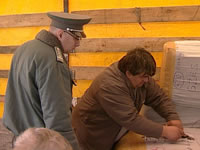
| 4. Action taken against OC: operational cooperation – legal cooperation – role of Stability Pact Well aware of the urgent need to act at regional level, Balkan countries are stepping up their common fight against crime, strongly encouraged by the EU and the Stability Pact. For the arrest of Macedonia’s sex trade king Leka, information exchanged via the SECI Center in Bucharest was of key importance. Behind these walls, customs and police officers from 12 Southeast European countries work together under the same roof. The goal is operational cooperation and fast information exchange. But joint police actions are just one step. Criminals must be brought to court on solid legal grounds. That’s what’s still lacking, with incompatible criminal legislation between the countries. Leka is now under trial in Macedonia. That wouldn’t have happened without the extradition agreement between the two countries. Many other criminals still benefit from the lack of legal cooperation between neighbouring countries. Political will is needed to push for common legal standards. Under the auspices of the Stability Pact, the Sarajevo Declaration was adopted in October by the Ministers of Justice of Southeastern European countries, gathered in the Bosnian capital. In signing this document, they aligned themselves to the UN Convention against Organised Crime. | 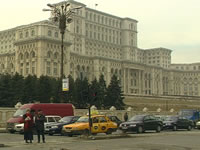
| Miljenko Kovac, Deputy Minister of Justice, Croatia: « This initiative means a lot for the Republic of Croatia. As you know, Croatia is a small and not very wealthy country. In the struggle against organized crime, the global kind in particular, we cannot achieve anything on our own. Therefore we need the support of the international community, not only financial help but also advisory assistance.” |  | Nikola Prokopovski, Adviser, Ministry of Justice, Macedonia: “You cannot fight organized crime on the local level. Cooperation with other countries in the region is enormously important for the successful crackdown on crime and corruption, for those two phenomenons behave according to the domino theory and the communicating vessels principles.” In gathering the Ministers of Justice around one table, the Stability Pact is not only trying to push for legal harmonization, but also to bring them closer to EU standards in areas such as witness protection, personal data protection or border control. | Nikola Prokopovski at Sarajevo conference Shots of Ministers of Justice during the Sarajevo conference | Pieter Verbeek, Stability Pact Security Table Director “We have here Ministers of Justice reporting on national implementation. So that is, for us, the most interesting part. It’s the national authorities who take the action. We listen to what they can report. The Stability Pact in Brussels is making a diagram where we make an inventory of all the national responses.” | Pieter Verbeek at Sarajevo conference | Gabrijela Konevska, Stability Pact Organised Crime expert “Another thing is the need to develop a system of witness protection and the appropriate legislation. It is an important judicial instrument in order to have a successful outcome and epilogue of trials and actions against organized crime. The next thing is personal data protection, in order for us to be a credible partner for cooperation with EU countries and particularly with Europol.” To be better equipped to fight trans-border crime, it is essential that Balkan countries can link up and liaise with international agencies such as Europol. Europol’s main job is police coordination and information exchange at EU and international level. Full cooperation of the Bucharest SECI center with Europol cannot start yet, due to the lack of appropriate laws on data protection in some Balkan countries. As long as these laws are not in place, Europol and other agencies will hesitate to share intelligence, fearing it might end up in the wrong hands. Legal change takes time. To make things move faster in urgent situations like human trafficking, the Stability Pact has launched an initiative to provide immediate help. The aim is to issue temporary residence permits to the victims. This should clarify their status in the country where they ended up – many of them were considered illegal and expulsed to their home country after they were found by the police. A second unnecessary trauma. | Gabriela Konevska at Sarajevo conference Shot of Europol offices in The Hague Shots of Belgrade, girls and shelter | Christopher Gascon, Head of IOM Belgrade
On the aims of the temporary residence permits for victims of trafficking In some countries like Albania, outside help is clearly needed to fight against criminal networks. The EU is providing training and new equipment to the border police. The border guards in Albania are not only in need of new working methods. Sometimes it`s much more basic than that- some border crossings don`t even have electricity. Nevertheless, key results have been achieved in cracking the well-known criminal networks operating across the Adriatic. Co-operation is the key. On board of this ship: a joint patrol of the Albanian and Italian police. Since 1997, the two border guards services have worked side by side. What`s important here is a transfer of knowledge, an exchange of good practices and the establishment of mutual trust. Visible results: these boats were all seized at sea- once owned by smugglers.It is exactly this type of cooperation that the EU and the Stability Pact would like to see among all Balkan countries. | Set up shots IOM Belgrade Albanian coast, port of Durres 
Close shots of Albanian and Italian police officer | | If the Adriatic smuggling route is now much less popular in criminal circles, one thing is sure: another route is being planned. Only when matched with intensive regional police and legal cooperation will transnational criminal networks be strongly discouraged. | 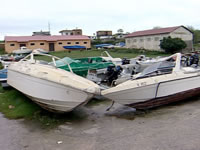 |
|
|
 Facebook
Facebook Twitter
Twitter


 2. The ingredients of OC in the Balkans – political links – post-conflict zones – weak borders – trafficking of goods and human beings
2. The ingredients of OC in the Balkans – political links – post-conflict zones – weak borders – trafficking of goods and human beings 
 These mountains are well known on the map of organized crime. A triangle border area between Macedonia, Kosovo and Albania. The Kodra Fura border crossing became a strategic point in the recent conflict in Macedonia. From here, almost every route between Kosovo and Macedonia can be controlled. But hiding behind the ethnic conflict, well organized mafias operate across border lines. In this hard to control, inhospitable land, weapons and drugs smuggling flourishes, ignoring ethnic differences. To these criminal networks, the new and poorly managed border lines of the region form a shield rather than a barrier. Once crossed, the police is left one step behind.
These mountains are well known on the map of organized crime. A triangle border area between Macedonia, Kosovo and Albania. The Kodra Fura border crossing became a strategic point in the recent conflict in Macedonia. From here, almost every route between Kosovo and Macedonia can be controlled. But hiding behind the ethnic conflict, well organized mafias operate across border lines. In this hard to control, inhospitable land, weapons and drugs smuggling flourishes, ignoring ethnic differences. To these criminal networks, the new and poorly managed border lines of the region form a shield rather than a barrier. Once crossed, the police is left one step behind.









